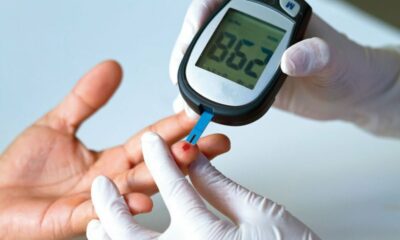Diabetes is a chronic condition characterized by high blood sugar levels. While most commonly associated with managing blood sugar, diabetes can have a far-reaching impact on the entire body. This guide delves into the different ways diabetes affects the body, exploring the potential complications and emphasizing the importance of effective management.
Understanding Blood Sugar and Its Role
Blood sugar, also known as glucose, is the primary source of energy for our cells. The body naturally regulates blood sugar levels through a complex interplay of hormones, primarily insulin and glucagon.
- Insulin: Produced by the pancreas, insulin acts like a key, unlocking the doors of cells and allowing glucose to enter for energy production.
- Glucagon: Also produced by the pancreas, glucagon acts like the opposite of insulin, raising blood sugar levels when they fall too low.
In diabetes, this delicate balance is disrupted. Here’s how the two main types of diabetes affect blood sugar:
- Type 1 Diabetes: The body doesn’t produce enough insulin, or no insulin at all.
- Type 2 Diabetes: The body either develops resistance to insulin, or doesn’t produce enough to overcome this resistance.
Chronically high blood sugar levels, a hallmark of diabetes, can wreak havoc on the body over time, leading to a cascade of potential complications.
A Domino Effect: How Diabetes Affects Different Organs
1. The Cardiovascular System (Heart and Blood Vessels):
- High blood sugar can damage blood vessels, increasing the risk of:
- Coronary artery disease (CAD): Leading cause of death in people with diabetes.
- Stroke: When blood flow to the brain is blocked.
- Peripheral arterial disease (PAD): Reduced blood flow to the legs and feet, which can lead to pain, numbness, and even amputation.
2. The Eyes (Diabetic Retinopathy):
- High blood sugar can damage the delicate blood vessels in the retina, the light-sensitive layer at the back of the eye. This can lead to:
- Blurred vision
- Blindness if left untreated.
3. The Kidneys (Diabetic Nephropathy):
- Chronically high blood sugar can damage the filtering system in the kidneys, leading to:
- Kidney disease
- Kidney failure in severe cases.
4. The Nerves (Diabetic Neuropathy):
- High blood sugar can damage nerves throughout the body, leading to:
- Pain
- Numbness
- Tingling
- Digestive problems
- Sexual dysfunction
5. The Feet (Diabetic Foot Problems):
- Nerve damage and poor circulation in the feet can lead to:
- Loss of sensation
- Foot ulcers (sores) that don’t heal well
- Increased risk of infection
- Amputation in severe cases.
6. Skin and Oral Health:
- People with diabetes are more prone to:
- Skin infections
- Slow healing of wounds
- Gum disease
- Tooth loss
The Importance of Early Diagnosis and Effective Management
The good news is that by managing diabetes effectively, you can significantly reduce the risk of these complications. Early diagnosis and a comprehensive treatment plan that includes:
- Healthy Diet: Eating a balanced diet low in processed foods and added sugars can help control blood sugar levels.
- Regular Exercise: Physical activity improves insulin sensitivity and helps manage blood sugar.
- Medication: May include insulin injections or oral medications to regulate blood sugar levels.
- Blood Sugar Monitoring: Regularly monitoring blood sugar levels allows for adjustments in diet, exercise, or medication as needed.
- Lifestyle Changes: Managing stress, getting enough sleep, and quitting smoking are all crucial for overall health and diabetes management.
By working with your doctor and adopting a healthy lifestyle, you can take control of diabetes and minimize its impact on your body.
Additional Considerations:
- The Glycemic Index (GI): Understanding how different foods affect blood sugar levels can be helpful in managing diabetes. The glycemic index ranks foods based on their impact on blood sugar.
- The Long-Term Effects of Uncontrolled Diabetes: Left untreated, diabetes can lead to serious and life-threatening complications.
- The Emotional Impact of Diabetes: Living with a chronic condition like diabetes can be emotionally challenging. It’s important to prioritize mental well-being and seek support if needed.
The Future of Diabetes Management: A Glimpse of Hope
While diabetes remains a chronic condition, exciting advancements in research and technology offer a promising future for management and potentially even prevention. Here’s a glimpse into some of these developments:
- Artificial Pancreas Systems (Closed-Loop Systems): These next-generation insulin pumps continuously monitor blood sugar levels and automatically adjust insulin delivery, mimicking the natural function of a healthy pancreas.
- Continuous Glucose Monitoring (CGM) Advancements: Advancements in CGM technology are making sensors less invasive, more accurate, and potentially offering features like predicting blood sugar trends.
- Stem Cell Therapy: Researchers are exploring the potential of using stem cells to regenerate insulin-producing beta cells in the pancreas, offering a potential cure for type 1 diabetes.
- Gene Editing Technologies: Gene editing techniques like CRISPR hold promise for correcting genetic defects that contribute to type 2 diabetes.
- Preventative Measures: Research is ongoing to identify risk factors for diabetes and develop strategies for preventing the onset of the condition. This includes promoting healthy lifestyle habits and identifying individuals who might benefit from early intervention.
Conclusion
Diabetes is a complex condition that affects the entire body. However, with proper management and a healthy lifestyle, you can significantly reduce the risk of complications and live a full and active life. By staying informed about the latest advancements in diabetes research and technology, you can embrace a hopeful outlook on the future of diabetes management.
Disclaimer:
This information is not a substitute for professional medical advice. Always consult your doctor for personalized guidance on managing your diabetes.

 General Medicine2 weeks ago
General Medicine2 weeks ago
 General Medicine2 weeks ago
General Medicine2 weeks ago
 Diabetology1 week ago
Diabetology1 week ago
 Diabetology1 week ago
Diabetology1 week ago
 Diabetology7 days ago
Diabetology7 days ago
 Diabetology7 days ago
Diabetology7 days ago
 Diabetology1 week ago
Diabetology1 week ago
 Diabetology5 days ago
Diabetology5 days ago












